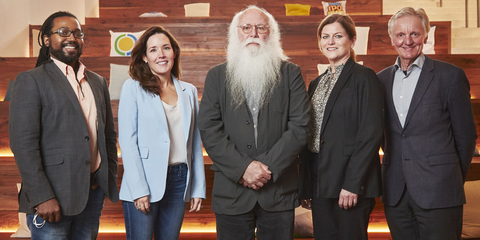Benson Hill’s Inaugural ESG Report Links Food Science, Data Science and Plant Science To Drive Modernization of the Food System
Company’s innovative plant-based protein ingredients require less processing steps, unlocking novel CO2e and water savings in CPG supply chains
Company announces formation of a
- Benson Hill’s first Environmental, Social and Governance (ESG) Report highlights its progress in developing programs that empower people, assess impact and establish governance at all levels.
- Benson Hill’s closed-loop business model is built on sustainable design and systems thinking, which means its products deliver consumer benefits beyond classic agriculture metrics like yield, to pure-play sustainable savings from seed to plate.
- The Company’s CleanCRUSH™ ingredients derived from its proprietary Ultra-High Protein soybeans are a less-processed alternative to commodity soy protein concentrate, reducing the need for costly energy- and water-intensive protein concentrating steps traditionally required for plant-based meat and aquaculture feed applications.
-
The Company also is announcing its
Sustainable Food Advisory Council , comprised of independent experts and thought leaders from across the food value chain, including nonprofits, academia, and the private sector.

Benson Hill’s new
“Companies working on seed improvement have a unique opportunity and responsibility to help address climate, health, and equity challenges in our food system. By applying systems thinking from the seed to the consumer, we are working to innovate products that deliver inherent social and environmental benefit throughout the value chain,” said
In addition to a materiality assessment, the online report includes highlights from Benson Hill’s key initiatives and accomplishments in 2021 that illustrate its vision for evolving the food system, including:
- The development of CleanCRUSH™ ingredients derived from the company’s proprietary soybean genetics. Designed as a less-processed alternative to commodity soy protein concentrate (SPC), CleanCRUSH ingredients can reduce the need for costly energy- and water-intensive protein concentrating steps traditionally required for plant-based meat and aquaculture feed applications.
-
The completion of a carbon credit pilot in partnership with the
Ecosystem Services Market Consortium to simplify the process for both farmers and food companies. Through the partnership, farmers can generate carbon credits and earn payments for reduced greenhouse gases and increased soil carbon sequestration as an outcome of their on-farm conservation practices. - The incorporation of a Life Cycle Assessment (LCA) to validate energy and water savings for Benson Hill’s ingredient customers. The LCA followed ISO 14040 methodology, covering farm inputs, farm production and soybean processing, all the way to finished ingredients.
- The Food System Innovators program engages forward-thinking farmers to evaluate and grow new seed innovations in commercial production environments. The program is anchored on a close working relationship with a two-way flow of information, directly connecting farmers with Benson Hill’s research, product development, and sustainability teams.
With the release of its 2021 ESG report,
“The era focused on processing and chemistry to solve food system challenges has passed. We’ve entered the era of biology-based solutions informed by natural systems, as exemplified in Benson Hill’s technology and integrated approach,” said Dr.
Other members of the new SFAC include:
-
Michael Doane , Global Managing Director, Food & Freshwater Systems for The Nature Conservancy, leads a team to scale up conservation outcomes across productively managed farming, ranching and agroforestry landscapes. With a background in row crops and livestock, Doane researches and advises on creative strategies to build new business models for the agri-food supply chain through finance, innovation, public policy and supply chain programs. -
Dr.
Ed McDonald IV , Assistant Professor of Medicine, Associate Director, Adult Clinical Nutrition at theUniversity of Chicago , is dedicated to improving health through food and nutrition. In practice he serves patients with obesity, bowel diseases, and other conditions affecting the digestive system. Dr. McDonald’s passion for the food-health connection extends to quality and flavor; he holds a certificate in professional cookery fromKendall College School of Culinary Arts and conducts extensive research on the digestibility of plant-based foods. -
Howard-Yana Shapiro , Ph.D., Senior Fellow of Ag and Environmental Sciences at theUniversity of California, Davis , has been involved with sustainable agricultural and agroforestry systems, plant breeding, molecular biology and genetics for more than 40 years. The former Chief Agricultural Officer atMars, Inc. , Shapiro keenly understands how to balance consumer expectations and planetary boundaries. A Distinguished Senior Fellow at the World Agroforestry Centre, he brings to the SFAC deep experience in coalition building and a global view on collaboration, having founded theAfrican Orphan Crops Consortium and developed the Keystone Roundtable on Sustainable Agriculture as a founding member. -
Stacie Sopinka , Vice President, Own Brands, Sobeys, who has worked in the private label product development field for more than 25 years in both foodservice and retail. Tapping into decades of experience translating consumer trends into product innovation and supply chain value enhancement, she collaborates with hundreds of food and non-food manufacturers. Sopinka will contribute her extensive experience in international marketing, sustainability trends and consumer product research & development. -
Bernhard Van Lengerich , Ph.D., former Chief Scientific Officer and VP Technology Strategy, ofGeneral Mills , has been involved in transforming innovations for several decades with strong emphasis on future consumer needs for healthier food and more sustainable practices. He founded ‘Seeding theFuture Foundation ,’ a nonprofit focused on food security and food systems transformation, and has served on the Board of Directors of Beyond Meat. Trained as a food technologist and passionate about systems thinking, he is a board member of theGerman Institute of Food Technology (DIL), and a Fellow of theInstitute of Food Technologists (IFT) Chicago . -
Ryan Shadrick Wilson , Founder and CEO of Boardwalk Collective; founder and former Chairperson of Feeding Change (aMilken Institute global effort to catalyze a more nourishing, sustainable, and equitable food system); former General Counsel and Chief Strategy Officer of theWhite House's Partnership for a Healthier America; Chairperson ofTerritory Foods , a healthy meal delivery food-tech company; and, advisor to numerous leading investors, celebrities, and entrepreneurs at the intersection of policy, philanthropy, and food justice.
For more information on Benson Hill’s ESG progress and how the company is accelerating the pace of innovation in sustainable food production, download the full 2021 report at https://bensonhill.com/impact/.
About
Cautionary Note Regarding Forward-Looking Statements
Certain statements in this press release may be considered “forward-looking statements” within the meaning of Section 27A of the Securities Act of 1933 and Section 21E of the Securities Exchange Act of 1934. Forward-looking statements generally relate to future events or the Company’s future financial or operating performance and may be identified by words such as “may,” “should,” “expect,” “intend,” “will,” “estimate,” “anticipate,” “believe,” “predict,” or similar words. These forward-looking statements are based upon assumptions made by the Company as of the date hereof and are subject to risks, uncertainties, and other factors that could cause actual results to differ materially from those expressed or implied by such forward-looking statements. These forward-looking statements include, among other things, statements regarding the anticipated benefits of the Company’s sustainability and ESG initiatives, statements regarding the Company’s strategy and plans for growth, statements regarding the expected future performance of and demand for the Company’s products, technologies and integrated business model, statements regarding the Company’s ability to manage and develop its product pipeline, statements regarding the Company’s ability to realize anticipated benefits from completed and potential business combinations and relationships with third parties, statements regarding expectations about the markets in which the Company participates, statements regarding the Company’s ability to attract, train and retain key personnel, and statements regarding the Company’s competitive positioning, resources, capabilities, and expectations for future performance. Factors that may cause actual results to differ materially from current expectations include, but are not limited to, risks associated with the Company’s ability to achieve its sustainability and ESG goals, risks associated with the Company’s ability to grow and achieve growth profitably, risks associated with the Company’s ability to maintain relationships with its customers, suppliers and strategic partners, risks associated with changing industry conditions and consumer preferences, risks associated with the Company’s ability to retain key personnel and generally execute on its business strategy, risks associated with global and regional economic, agricultural, financial and commodities market, political, social and health conditions, risks associated with the Company’s transition to becoming a public company, the effectiveness of the Company’s risk management strategies, and other risks and uncertainties set forth in the sections entitled “Risk Factors” and “Cautionary Note Regarding Forward-Looking Statements” in our filings with the
View source version on businesswire.com: https://www.businesswire.com/news/home/20220721005309/en/
Media Contact
Melanie Bernds
314-605-6363
Media Kit
Investor Contact
314-714-6313
rmella@bensonhill.com
Source:







